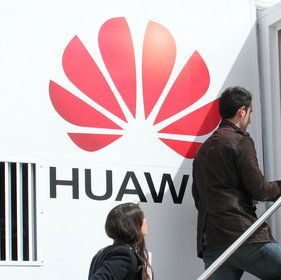
Huawei has published its 5G licensing rates, setting a cap of $2.50 per unit for handsets.
At a briefing Tuesday it announced it would additionally charge "a reasonable percentage royalty rate" of the selling price of each unit.
Jason Ding, vice president and head of IP department, acknowledged the rates covered only smartphones and not the plethora of other devices that are in line to connect to 5G networks.
"It's difficult to define a percentage," he said.
In any negotiations with IoT device-makers, Huawei would "allow a certain flexibility, but for the smartphone it is quite clear."
In setting the royalty, the company had sought to take a "balanced position" between achieving a return on sunk research cost and affordability, he said.
"As the largest technical contributor to the 5G standard, we believe there should be a balance between R&D investment and the cost of the implementation by they industry," he said.
"We hope this will give 5G investors a number they can rely on for the cost for estimation and investment decisions."
Huawei modestly described the new royalty rate as "a major step towards accelerating the deployment of 5G globally, which will give rise to enormous possibilities in every sphere of life."
Interested in Asia? Check out our dedicated content channel here on Light Reading.
But compared to other major patent holders, it's rather late to the party.
Ericsson and Qualcomm published their royalty rates in 2017 and Nokia in 2018.
Ding's explanation was that the 3GPP release was not frozen until 2019, and to determine the fee Huawei had had to evaluate its entire contribution and that of others.
Despite this careful parsing of the specs, Ding added: "We might be the top contributor of the standard, but that doesn't mean Huawei will charge the top dollar."
(Huawei cites a newly-published joint analysis from Amplified and GrayB to back its claim that it leads 5G IP. They found it accounts for 18.3% of essential patent families.)
Ding said Huawei was committed to the industry licensing principle of fair, reasonable and non-discriminatory (FRAND) terms.
He pointed out Huawei had begun working on 5G in 2009 and had worked on the standard since 2016, with commercialization only commencing in 2020.
“That's 11 years to start getting return on investment,” he said.
Patently obvious
Ding said Huawei expects to achieve patent licensing sales of about $1.2 billion to $1.3 billion for the period 2019-201.
But Huawei's chief legal officer, Song Liuping, ruled out the prospect of the vendor turning the licensing business into a major new revenue stream.
He said the company's main business was ICT products and services.
"We don't position IP as a major source of revenue. If you compare against other revenue you see the position quite clearly."
— Robert Clark, contributing editor, special to Light Reading
Read more about:
AsiaAbout the Author(s)
You May Also Like











